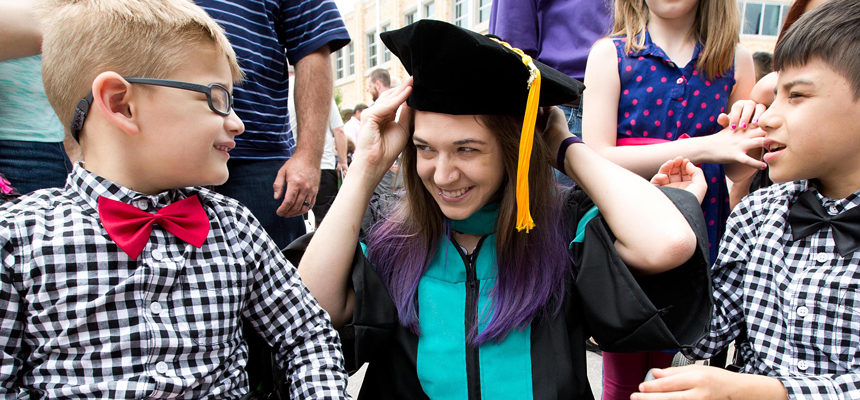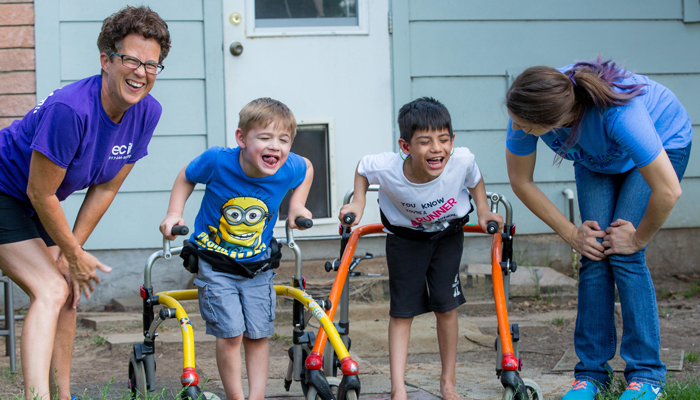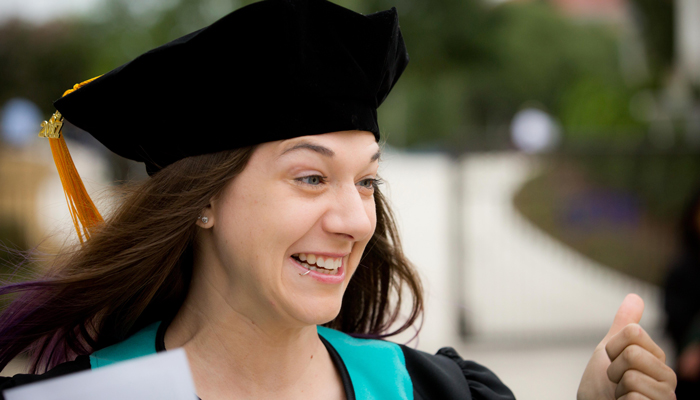‘Don’t tell them that they can’t’
By Alex Branch

Londyn Miner can pinpoint the moment that started her path to UNT Health Science Center.
It was seven years ago in her Granbury living room, as she tearfully explained her 15-month-old son’s devastating prognosis to a physical therapist.
An MRI had revealed that Orion’s cerebellum — the part of the brain that regulates motor function — had stopped growing when Orion was 10 months old.
It meant his speech, motor skills and balance coordination would be severely limited.
“The doctor says he’ll never walk or talk,” Miner said.
What kind of a life would Orion have? Miner wondered.
“No, Orion probably won’t stand up and run,” said Gretchen Cooper, the physical therapist. “But don’t tell him that he can’t. Don’t tell him that he is going to have to spend his life in a wheelchair.
“Keep pushing him, and let him decide his own boundaries.”
That moment – and the impact physical therapy made in Orion’s life – inspired Miner to pursue a doctor in physical therapy degree so she could change the lives of families like hers.
A first step
An interest in medicine runs in Miner’s family. Her brother, Talon Miner, earned his Doctor of Osteopathic Medicine degree from UNT Health Science Center in 2015.
When Orion was born, Londyn Miner was working on an undergraduate degree at Tarleton State University. Suddenly a mother at age 20, she postponed thoughts of following her brother’s footsteps into medical school.
Miner noticed delayed development in her son. Orion wasn’t walking and struggled to crawl or keep his balance. After his diagnosis, none of the specialists could explain what caused his neurological condition, which shares some similarities with cerebral palsy.
Miner concentrated on working with Cooper to improve her son’s independence. During physical therapy visits, Cooper sat on the carpet with Orion and made therapy fun.
Want your favorite toy? Just move over here and grab it. Want to play with bubbles? Pull yourself up and take the container off the table. Like Star Wars? Take this toy lightsaber and try to hit this bowling pin.
“I remember watching the first time he stood up without holding on to anything,” Miner said. “And the first step he took all by himself. Moments I never thought he would experience.
“Therapy was making such a big difference in Orion’s life. I started thinking it was something that I would really like to help do for others.”
When Miner became pregnant again, the news brought joy but also great anxiety. Would her second son experience the same neurological condition as Orion? Doctors and specialists assured her the chances were small. There was no evidence that Orion’s health problems were genetic.
Xander was born in June 2011. Miner noticed he had an unusual way of shuddering awake in the morning. Her anxiety grew.
In 2012, doctors determined that, just like his big brother, Xander’s cerebellum stopped growing when he was about 10 months old. There was no medical consensus on why.
Miner remembered Gretchen’s words: “Don’t tell him he can’t.”
That gave her hope.
A family atmosphere

Just like with Orion, physical therapy would have an exceptional impact on Xander’s life.
To be sure, it took a team of specialists — neurologists, ophthalmologists, speech therapists and more — to enhance her boys’ quality of life. But the physical therapy fueled Miner’s desire to join the field and help others.
Most students hoping to get an advanced physical therapy degree apply to multiple schools. It’s a highly competitive field, and the more applications one submits, the better the chances of getting accepted somewhere.
Miner applied to exactly one school – UNT Health Science Center.
With two young boys with special needs at home, she sought a family-friendly school in close proximity to Granbury. And she knew UNTHSC had a nationally respected physical therapy program.
Miner found the family atmosphere she sought. Faculty members, their office doors always open, accommodated the endless doctors’ appointments she attended with the boys. Instructors learned her sons’ names.
Several scholarships, funded by UNTHSC donors, helped her with the cost of physical therapy school, assistance for which Miner said she is eternally grateful.
Pediatric patients are often difficult to find for classroom examples, so she brought the boys to class where Yasser Salem, PT, PhD, Interim Chairman of the Physical Therapy Department, treated them to help students learn.
Brandy Schwarz, DPT, EdD, Assistant Professor of Physical Therapy and coordinator of student rotations, helped Miner find clinical rotations that kept her within a reasonable proximity of the boys while also not limiting her opportunities.
“Londyn’s family experiences give her invaluable insight into physical therapy from the patient’s point of view,” Dr. Schwarz said. “She has worked very hard and has taken advantage of many of the opportunities our program offers students.”
One anecdote encapsulates her time at UNTHSC, Miner said. Orion has developed a great affinity for bowties. He even wears them to elementary school. At a UNTHSC orientation, she mentioned this to Thomas Moorman, EdD, Vice President of Student Affairs, a bow tie aficionado himself.
She showed him a picture on her phone of Orion, beaming in a bowtie.
After lunch, Dr. Moorman approached Miner with a manila envelope containing two bowties and a note for Orion about the practice it takes to tie one properly.
The note is framed at home, a reminder of her HSC family.
Her dream job

Miner, now 28, prepared for UNTHSC commencement with a business-like calm. But onstage in her cap and gown, the reality of the moment hit her.
She was about to receive her Doctorate of Physical Therapy.
“It felt amazing,” she said.
In the crowd, Orion, now 8, and Xander, 6, wore black-and-white checkered shirts and bowties.
Neither boy can walk independently. They get around using gait trainers but rely on wheelchairs to cover long distances or navigate crowds. They speak, laugh, play and even do mud runs with their mother and her boyfriend.
They fall down a lot – bruises and stitches are common – and sometimes get angry when their bodies won’t move as they wish. But it’s a life far beyond what Miner had imagined for boys with original prognoses that they would never walk or talk.
Miner’s name was called. She walked across the stage, received her graduation hood and diploma. She hugged her boys.
Miner has taken a job with Early Childhood Intervention at MHMR of Tarrant County, the same organization where Gretchen Cooper, their first physical therapist, works. Cooper is Miner’s mentor.
She will work as a licensed physical therapist making a difference in the lives of children 0 to 3 years olds around Hood, Erath, Somervell and Johnson counties. It is her dream job.
No doubt Miner will one day sit in someone’s living room, listening to scared parents share their fears about all the things their son or daughter may never get to do.
She’ll understand and try to give the parents hope.
“Don’t tell them they can’t,” she’ll say.





Social media